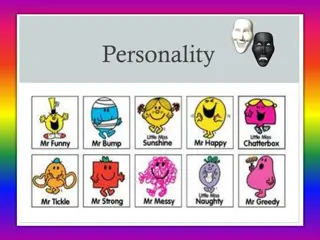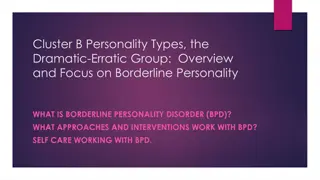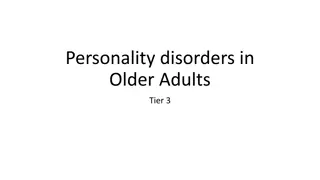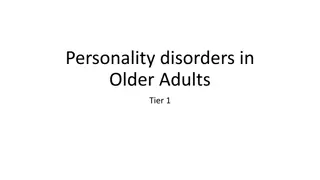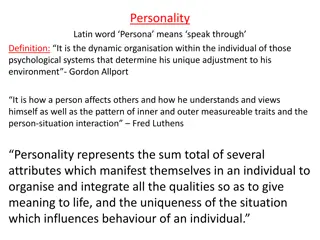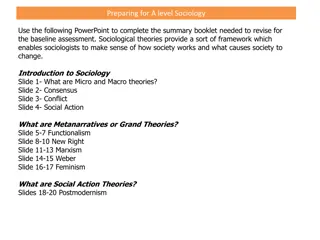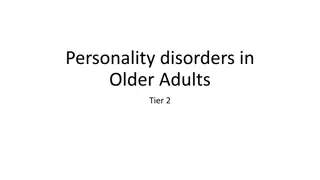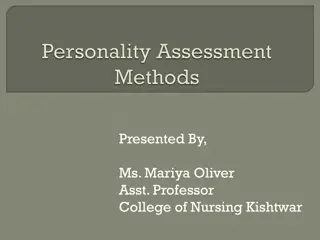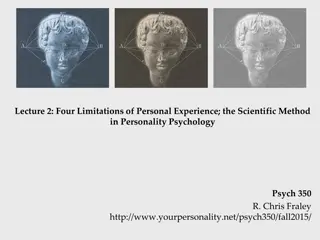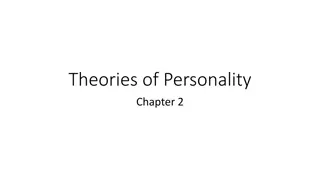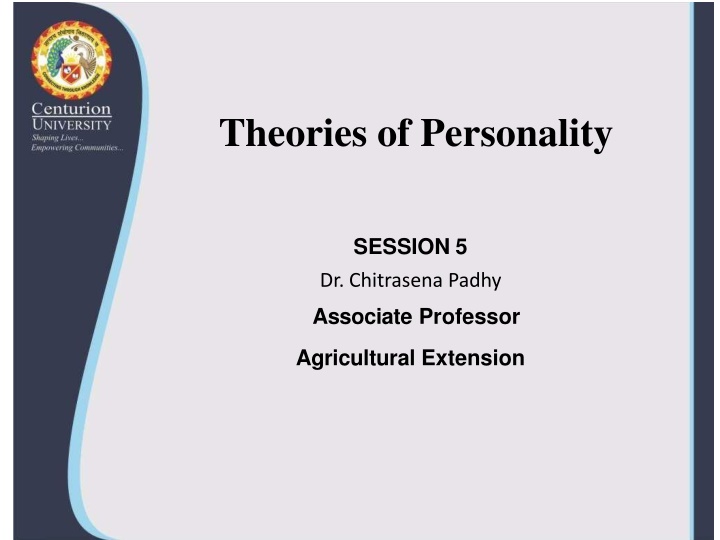
Personality: Key Concepts and Theories
Explore the diverse aspects of personality, from individual differences to characteristic patterns of behavior and thought. Delve into the dynamic nature of personality development, influenced by both biology and environment. Gain insights into renowned theories shaping our understanding of what makes each person unique.
Download Presentation

Please find below an Image/Link to download the presentation.
The content on the website is provided AS IS for your information and personal use only. It may not be sold, licensed, or shared on other websites without obtaining consent from the author. If you encounter any issues during the download, it is possible that the publisher has removed the file from their server.
You are allowed to download the files provided on this website for personal or commercial use, subject to the condition that they are used lawfully. All files are the property of their respective owners.
The content on the website is provided AS IS for your information and personal use only. It may not be sold, licensed, or shared on other websites without obtaining consent from the author.
E N D
Presentation Transcript
Theories of Personality SESSION 5 Dr. Chitrasena Padhy Associate Professor Agricultural Extension
Personality Personality refers to individual differences in characteristic patterns of thinking, feeling and behaving. The study of personality focuses on two broad areas: One is understanding individual differences in particular personality characteristics, such as sociability or irritability. The other is understanding how the various parts of a person come together as a whole.
Personality describes the unique patterns of thoughts, feelings, and behaviors that distinguish a person from others. A product of both biology and environment, it remains fairly consistent throughout life. Examples of personality can be found in how we describe other people's traits. For instance, "She is generous, caring, and a bit of a perfectionist," or "They are loyal and protective of their friends."
Personality, of thinking, Personality embraces moods, attitudes, and opinions and is most clearly expressed in interactions with other people. a feeling, characteristic and way behaving. It includes behavioral characteristics, both inherent and acquired, that distinguish one person from another and that can be observed in people s the environment and to the social group. relations to
"Personality is the dynamic organization within the individual psychophysical systems that determine his characteristics behavior and thought" (Allport, 1961, p. 28) of those The characteristics that make a person unique (Weinberg & Gould, 1999). characteristics or blend of
We must also consider the influence and interaction of nature (biology, genetics, etc.) and nurture (the upbringing) with respect to personality development. environment, Trait personality is biologically based, whereas state theories such as Bandura's (1977) Social Learning Theory emphasize the role of nurture and environmental influence. theories of personality imply
Personality is broadly described as the characteristic patterns feelings, and behaviors that make a person unique. In plain English, it is what makes you you. of thoughts,
Personality makes us who we are. It influences nearly every aspect of our lives including what we choose to do for a living, how we interact with our families, and our choices of friends. Personality Is Relatively Stable
Five Factor Theory of Personality Extraversion Agreeableness Conscientiousness Neuroticism Openness
Extraversion Extraversion is one of the five personality traits of the Big Five personality theory. Extraversion indicates how outgoing and social a person is. A person who scores high in extraversion on a personality test is the life of the party. They enjoy being with people, participating in social gatherings, and are full of energy. A person low in extraversion is less outgoing and is more comfortable working by himself.
Person high in extraversion is outgoing and enthusiastic Individuals high in extraversion on a career test have a tendency to seek out the company and stimulation of other people. They enjoy engaging with the external world. These individuals thrive on excitement, and are enthusiastic, action-oriented people. They like to be the center of attention in groups.
Sub traits of the extraversion trait Friendliness Gregariousness Assertiveness Activity level Excitement-seeking Cheerfulness
Agreeableness Agreeableness is a personality trait that describes a person s ability to put others needs before their own. Those who are more agreeable are more likely to be empathetic and find pleasure in helping others and working with people who need more help. Agreeable people are generally well-liked and prefer cooperation over conflict and scoring high in agreeable tendencies also means that you have an ability to maintain relationships.
Characteristics of agreeable personalities Polite Being polite or exhibiting politeness is a common characteristic of agreeableness. This may be from the way you speak on the phone to someone conversation with strangers. Considerate Showing empathy and consideration for others is again, a common characteristic. Understanding how someone else is feeling and considering how the actions of others or yourself can contribute to that person or group of people is common. to engaging in
Trusting Highly agreeable people are prone to assume that others mean well and have good intentions. They are less likely to judge others or make snap decisions about people choosing to show compassion and kindness in abundance. Cooperative Often seen as peacemakers over those that like confrontation and disruption. Highly agreeable people will often compromise their own needs for others.
Modest This is also very common, where agreeable individuals are very down to earth and humble.
Theories of Personality Personality theories have been used throughout history to address what makes up the personality of an individual. A personality is how a person thinks, feels, and behaves. This influences how the person interacts with their environment. Personality is generally stable, although it can be influenced by environmental individual's personality causes them to react to certain scenarios and people. The four personality theories are: psychoanalytic humanistic trait perspective behaviorist theory factors. An
Psychoanalytic Personality Theory Definition The psychoanalytic personality theory was developed by famed psychoanalyst Sigmund Freud. Freud believed that personality was a summation of their innate instincts and their parental influences. He thought that these two forces, nature, and nurture, worked together to form a complete personality. an individual's
Freud believed that personality was made up of the following components: instincts that drive behavior such as sex, hunger, and thirst unconscious thought processes that the person is unaware of childhood events, influence and nurturing events particularly parental
He believed that the events of the first five years of life developed the personality of adults. The instincts and the environment of a child during these crucial years would affect his personality development.
Freud also believed that personality was defined by three components: The id controls the instinctual urges of a person. The ego moderates the urges of the id and superego and keeps them in check with reality. The superego is responsible for the development of a person's morals.
Freud hypothesized that children developed their personalities by progressing through a succession of stages that focused on particular regions of the body. If a child progressed through the stages without incidence, they would be well- developed in that area. If not, they may develop an infatuation later in life. For example, if a child does not successfully pass the oral stage in life, they may develop an eating disorder later in life or may become a chronic thumb-sucker.
Humanistic Personality Theory Definition The humanistic personality theory was developed by Katherine Cook Briggs and Isabel Briggs Myers, a mother and daughter. Humanistic personality theory highlights the importance of self-growth to develop healthy personality traits. The researchers developed the test to understand the differences in personalities.
They developed the Myers-Briggs Type Indicator, a questionnaire created in 1975 to help people personality type. understand their This test is used in clinical settings as well as research settings and has been translated into thirty languages.
The test helps the individual understand four components of personality: Introversion or extraversion whether the person receives gratification from an outside stimulus, extraversion, or internal stimulus, introversion. Sensing or intuition refers to if the person pays more attention experiences, sensing, scenarios, intuition. Thinking or feeling measures if a person makes decisions based on facts, thinking, or emotion, feelings. Judging or perceiving measures if a person prefers structure, judging, or if they are more adaptable, perceiving. refers to to hands-on imaginative or
The Trait Perspective Personality Theory Definition The trait personality theory emphasizes the characteristics of the personality and is less concerned with the development of the personality. This theory concentrates on the descriptive terms used to detail an individual. This theory believes that these descriptive terms, such as happy, outgoing, and angry, make up a personality.
The character traits this theory focuses on are called the Big Dimensions: Openness measures a person's adaptability, abstract thinking, and creativity. Conscientiousness individual's ability to meet goals, pay attention to details, and prepare for tasks. Extraversion measures if a person is excitable, easy to talk to, assertive, and conversational. Agreeableness measures the person's trust, empathy, affection, and kindness with others. Neuroticism focuses on whether a person is moody, stressed, sad, depressed, or is dramatic. Five Personality focuses on an
This determined by relatively stable traits which are the fundamental units of one s personality. approach assumes behavior is Traits predispose one to act in a certain way, regardless of the situation. This means that traits should remain consistent across situations and over time, but may vary between individuals. It is presumed that individuals differ in their traits due to genetic differences.
Eysencks Personality Theory Eysenck (1952, 1967, 1982) proposed a theory of personality based on biological factors, arguing that individuals inherit a type of nervous system that affects their ability to learn and adapt to the environment. During 1940s Eysenck was working at the Maudsley psychiatric hospital in London. His job was to make an initial assessment of each patient before their mental disorder was diagnosed by a psychiatrist.
Through this position, he compiled a battery of questions about behavior, which he later applied to 700 soldiers who were being treated for neurotic disorders at the hospital (Eysenck (1947). He found that the soldiers' answers seemed to link naturally with one another, suggesting that there were a number of different personality traits which were being revealed by the soldier's answers. He called these first-order personality traits
He used a technique called factor analysis. This technique reduces behavior to a number of factors which can be grouped together under separate headings, called dimensions.
Eysenck (1947) found that their behavior could be represented by two dimensions: Introversion / Extroversion (E); Neuroticism / Stability (N). Eysenck called these second-order personality traits.
A determined their sympathetic nervous system. A stable person s nervous system will generally be less reactive to remaining calm and level headed. person s level by of neuroticism reactivity is of the stressful situations, Someone high in neuroticism on the other hand will be much more unstable, and prone to overreacting to stimuli and may be quick to worry, anger or fear. They are overly emotional and find it difficult to calm down once upset. Neurotic individuals have an ANS that responds quickly to stress.

